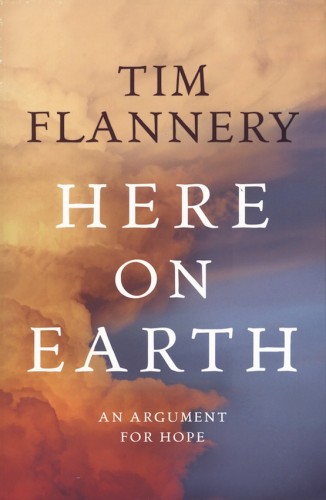Hope is the message that emerges from a sweeping analysis of our present time on Earth. This is Tim Flannery’s best book yet.
[30 September 2010 | Peter Boyer]
 Tim Flannery’s new book, Here on Earth, is the story of life on Planet Earth. Themes don’t come any bigger than this, so Flannery sensibly draws on the insight of some legends of science who between them have brilliantly illuminated our quest to grasp what it’s all about.
Tim Flannery’s new book, Here on Earth, is the story of life on Planet Earth. Themes don’t come any bigger than this, so Flannery sensibly draws on the insight of some legends of science who between them have brilliantly illuminated our quest to grasp what it’s all about.
Charles Darwin and his latter-day acolyte, Richard Dawkins, two of the greats of evolutionary biology, open the story. Flannery sees them as reductivists: people who see the big picture in terms of its component parts (which in the case of evolution adds up to an awful lot of parts). Fussy, particular types, but people with important messages.
Others featuring in his story are Alfred Russel Wallace, who jointly with Darwin first framed the theory of natural selection, and physicist James Lovelock, author of the Gaia hypothesis, according to which our planet and its life forms are a single, dynamic system.
To Flannery, Wallace and Lovelock are synthesisers. Looking at the intricacy of nature, both the physical world and the life that’s on it, they saw the whole thing as a complete, interacting, inter-dependent system. And from these opposing perspectives emerges a powerful story.
Like Wallace and Lovelock, Flannery is a synthesiser. The books that built his reputation as a big thinker were The Future Eaters (1994) and The Eternal Frontier (2001), multi-million-year histories of the inhabitants of Australasia and North America.
The Weather Makers (2005) won him a global readership. This “manual on the use of Earth’s thermostat”, as he described it, propelled him to an Australian of the Year award in 2007 and world-wide demand for his unique elucidation of this complex dilemma.
I’m a fan of Flannery. The Future Eaters is the best book yet on the prehistory of our part of the world — an original, lucid perspective on the ecology of Australia, New Zealand, New Guinea and New Caledonia, and how humans have shaped these lands over many thousands of years.
Here on Earth takes the ideas of all Flannery’s earlier work and applies them on a planetary, millennial scale. It includes themes expounded in The Weather Makers, but is a much more ambitious work.
Its description of how life interacts with physical Earth — the role of living organisms in shaping our planet’s crust, atmosphere and ocean waters — is an exceptionally powerful evocation of Lovelock’s Gaia thesis. But unlike Lovelock, Flannery finds reason for hope.
To the problem of how we got to our present, Flannery applies what he has learned from times long past for inspiration in living our 21st century lives. His experience and expertise as a palaeontologist has taught him much about how animals (including humans) have lived and interacted with their natural surroundings.
He also brings optimism. It’s true that we’ve remorselessly exploited our natural surroundings, but so have we always done. In times past we’ve also found it within us to save what’s essential to our survival — essentially, to find a kind of love for the place that’s the only home for us and all the other living things we share it with.
This eloquent, intelligent, powerfully challenging book is Flannery’s most cogent testament yet to his great affection for this planet and its people, and his commitment to their joint future. It left me refreshed, and in these taxing times that’s a priceless gift.
Publishing details:
Author: Tim Flannery
Title: Here on Earth: An argument for hope
Pages: 316
Publisher: The Text Publishing Company, Melbourne
